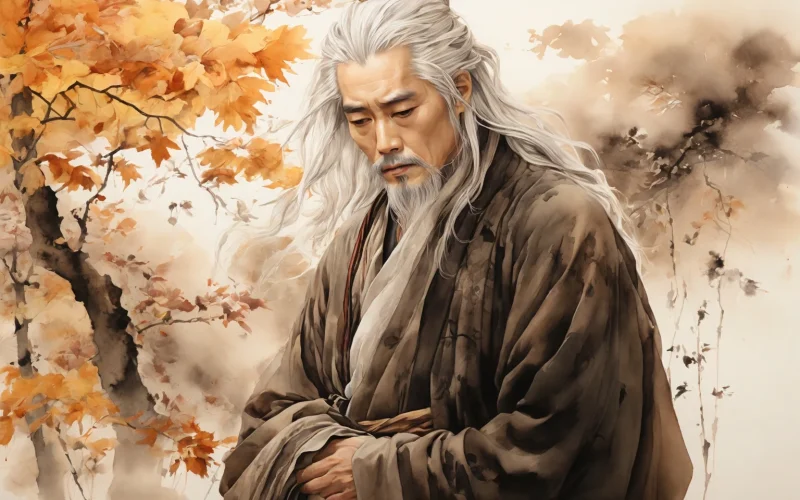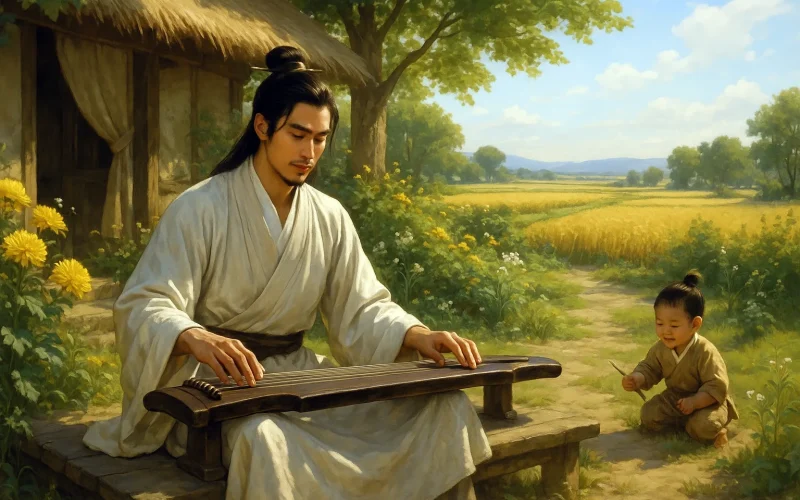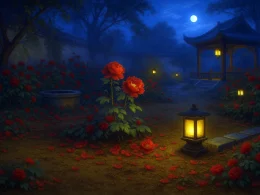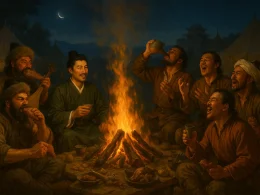Time bleaches my hair to frost;
Trees shed their gilded tears.
To trembling leaves I whisper, tempest-tossed:
"Shall we mourn the dying year?"
Original Poem
「伤秋」
卢纶
岁去人头白,秋来树叶黄。
搔头向黄叶,与尔共悲伤。
Interpretation
This contemplative autumn poem expresses the poet's profound melancholy upon observing time's passage and life's inevitable aging. Through autumn winds and falling yellow leaves, nature's decay mirrors human frailty and resignation, with withered leaves becoming confidants for the poet's solitary sorrow.
First Couplet: "岁去人头白,秋来树叶黄。"
Suì qù rén tóu bái, qiū lái shù yè huáng.
Years pass - hair turns white; autumn comes - leaves yellow and fade.
The opening establishes parallel between human aging and seasonal change. "White hair" and "yellow leaves" intertwine human and natural cycles, creating subdued melancholy where scenery and sentiment merge seamlessly.
Second Couplet: "搔头向黄叶,与尔共悲伤。"
Sāo tóu xiàng huáng yè, yǔ ěr gòng bēi shāng.
Scratching my head, I face you yellow leaves - let us share this sorrow.
Personifying nature, the poet transforms leaves into compassionate companions. The gesture of head-scratching reveals restless anguish, while "share this sorrow" delivers lingering emotional depth through simple phrasing.
Holistic Appreciation
In just four plain yet philosophical lines, the poem progresses from observation to emotional communion. Human and arboreal aging first mirror each other, then merge through imaginative empathy. Rather than loud lament, the poet whispers his grief to autumn leaves, creating profound resonance through understatement. This externalization of inner turmoil onto nature's canvas demonstrates remarkable artistic economy and psychological insight.
Artistic Merits
- Deceptively simple language conceals profound existential meditation
- Nature-human resonance deepens emotional impact through seasonal metaphors
- Personification technique expands lyrical dimensions by animating leaves
- Precision crafting achieves maximal effect through minimal expression
Insights
The poem reveals how life, like foliage, must eventually fade. While acknowledging inevitable decline, it demonstrates how nature can become both mirror and companion for human emotions. The work suggests that profound grief requires no dramatic exposition - sometimes a single gesture (scratching one's head) or natural image (yellow leaves) can convey infinite melancholy. As the verses show: though leaves must fall, the poetry of shared sorrow endures.
Poem translator
DeepSeek
About the poet

Lu Lun (卢纶), 748 - 798 A.D., was a native of Yongji, Shanxi Province, and was one of the "Ten Scholarly Men of the Dali Dynasty". Lu Lun was a judge of the Marshal's Office in Hezhong, and he served as the inspector of the Ministry of Revenue. His poems were more eloquent and liberal, with many works of farewells and rewards, as well as works reflecting the life of soldiers. Five volumes of his poems are recorded in Quan Tang Shi (All Tang Poems).











